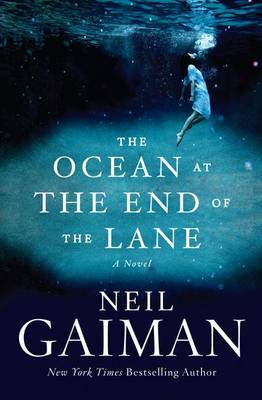JUST POSTED ON MY BLOG.
If you like this review, please consider popping by :)
_______________
"I wondered, as I wondered so often when I was that age, who I was, and what exactly was looking at the face in the mirror. If the face I was looking at wasn't me, and I know it wasn't, because I would still be me whatever happened to my face, then what was me? And what was watching?"
I think I have a new fantasy in life; to spend one day inside Neil Gaiman's extraordinary mind. I've a feeling it would either be the most incredible and magical experience of my life, or the most traumatizing one.
I wasn't sold on The Ocean at the End of the Lane before I started it. I've only read one of Gaiman's other novels, Stardust, and I wasn't overly impressed with it. So you could say I was wary of reading this book. Because what if I couldn't love it? What then?
So I breathed a sigh of pure relief when I opened the first page, the one from before the prologue, and realized that there is absolutely no way I could not love this. When I realized that this was going to be phenomenal.
"The Dream was haunting me: standing behind me, present and yet invisible, like the back of my head, simultaneously there and not there."
It's almost impossible to describe this book. If someone asks you what's it about, you would either over-explain it to the point you yourself couldn't make head or tail of it, or simplify it so much it would present it less than it actually is.
It's a book that needs to be read, and that's the best answer there is to it.
It's narrated by a man, recalling bizarre childhood experiences. He has no name. For most of the story, he is eight years old. But that's not to say the topics and subjects dealt with in this book are childish - au contraire.The depth, themes and manner of handling both is decidedly "adult".
If anything, this book could be read by anyone, but the level of understanding it would differ. I can see in my mind's eye my younger cousin reading it right now (as a young teen), and then reading it again in ten years and discovering a completely different experience. It's like watching these childhood cartoons you loved again and realizing so many of the jokes were wasted on your younger self. But you still loved them.
I think it's brilliant.
This book gave me the actual chills. It's like a horror story, only not... quite. The things this boy goes through are horrifying to the point I had to read with the lights on, but what was even scarier was how he forgot. Somehow, that seemed exceptionally cruel.
And don't think you can prepare yourselves; nothing happened as I thought it would, and at a certain point I had no idea what to expect anymore. It was like floating in a dream. You think you're headed in one direction, only to suddenly find yourself in a completely different story. The only difference was that this actually made sense.
Gaiman's lyrical, poetic, enchanting words were a big part of weaving this effect, as is the choice to make the boy and his life completely arbitrary. He has no name. His family is nameless. The city he lives in, his street... he could've easily been anyone, even me (were I a boy and had a sister).
And, for the duration of the book, it was. I guess that's the whole point.
"...In those dreams I spoke that language too, the first language, and I had dominion over the nature of all that was real. In my dream, it was the tongue of what is, and anything spoken in it became real, because nothing said in that language can be a lie. It is the most basic building brick of everything. In my dreams, I have used that language to heal the sick and to fly; once I dreamed I kept a perfect little bed-and-breakfast by the seaside, and to everyone who came to stay with me I would say, in that tongue, "Be whole.' and they would become whole, not be broken people, not any longer, because I had spoken the language of shaping."
